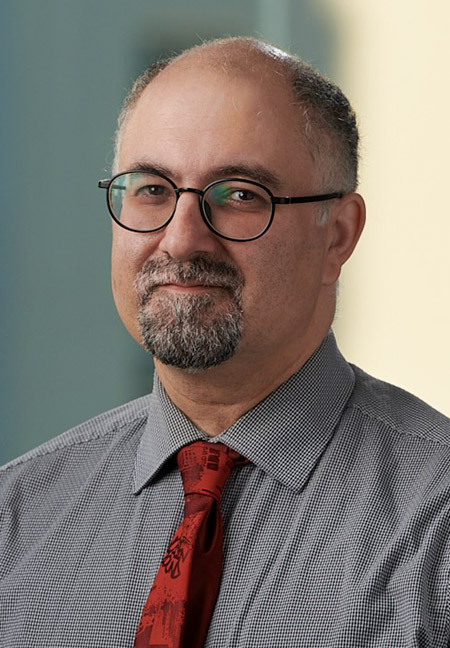
Dr. Amir Sepehry

Dr. Diana Velikonja
Dr. Amir Sepehry and Dr. Diana Velikonja, Psychopharmacology Section
At the intersection of psychology and medicine is psychopharmacology. Psychologists who can prescribe medication like a psychiatrist, but with a psychologist’s training in behaviour and therapy-based interventions. Dr. Amir Sepehry and Dr. Diana Velikonja tell us more.
It generally takes about ten years of schooling in Canada to become a psychologist. It’s one of the longest, most intensive fields of study there is as it generally requires a PhD or PsyD, those programs are quite small, and it takes longer to complete a psychology doctoral program than most others. Imagine going through all that, and then deciding ‘you know, I could really use a little more school’. What kind of keener do you have to be to take on MORE education when you’re finally done?
This is the decision made by those who choose to follow the path of psychopharmacology. Dr. Diana Velikonja is a neuropsychologist by training. She is a clinical psychologist, and has a masters in clinical psychopharmacology – that allows her to do consultations with regard to psychotropic medication. She has worked with people who have had head trauma, is the Past President of the Ontario Psychological Association, and has led initiatives to advocate for the scope of practice for psychologists in Ontario to include prescribing psychotropic medication. She explains psychopharmacology this way:
“For a lot of emotionally-based or cognitively-based challenges, there are specific types of medications that are used called ‘psychotropic’ medications. They’re primarily used to treat conditions like anxiety, depression, hallucinations. For mental conditions or addiction issues, they help manage the symptoms. Psychopharmacology is really prescribing medications in conjunction with other evidence-based treatments. The reason psychologists are involved in this is that we’re trained in behaviour and therapy-based interventions, and those of us who have sought additional certification with regard to prescribing psychotropic medication are able to integrate the two – the behavioural and the medication in order to help guide patients toward the best strategies to manage the symptoms they’re experiencing.”
Prescribing medication to treat mental illness has, at least in Canada, long been the domain of psychiatry. Psychopharmacologists are some of the very few psychologists who have that level of knowledge when it comes to those medications. Dr. Amir Ali Sepehry is the Chair of Psychopharmacology Section at the CPA. He has a PhD in neuroscience, post-doctoral training in neurology, a masters in psychiatric science investigating medications, and other training in spinal cord injuries, and counselling psychology. Dr. Sepehry is currently teaching at the Adler University (Vancouver) and collaborates with UBC, and working with forensic neuropsychologists on medical legal cases. He says the field of psychopharmacology is both very old, and very new.
“It goes way back to when people with a variety of specialities used substances, herbs, and so on for the treatment of mental illness. However, there has been an incredible acceleration in the past five years, because much has happened. One part of that is the SARS-COVID-19 we have experienced. There are minor developments happening, as many of us are trying to repurpose medications.”
A person’s normal anti-viral immune response requires the activation of the inflammatory pathways of the immune system. ‘Cytokines’ are produced as part of that immune response. An unchecked and outsized immune response is known as a ‘cytokine cascade’ or ‘cytokine storm’. This can lead to tissue damage, and has been seen in many severe cases of COVID-19. It comes about as a result of an overabundance of pro-inflammatory cytokines. Dr. Sepehry says this is one of the ways psychopharmacologists are looking at the repurposing of existing medications.
“Anti-depressants have shown anti-inflammatory properties, so they could be used toward the cytokine cascade that is evolving as a result of COVID. We are still at a stage where we have to see the long-term effects of COVID on the brain and behaviour, on personality changes and mental illness, and the potential recovery. There is more need for psychologists to get involved. We know that there is an increased rate of mental illness, particularly among older adults, who contracted COVID. So the involvement of psychopharmacology is crucial.”
Dr. Velikonja suggests that there are other ways medications can be studied, especially as we learn more about the effects of COVID, both short-term and long-term.
“Medications may be able to be repurposed to deal with things like the fatigue, what people talk about as the brain fog, the stuff that comes with what they call ‘long COVID’. When people have a lack of energy or physical motivation to do things, there’s probably some targeting that can be done in that domain.”
These past two years have seen a mobilization of scientific expertise the likes of which the world has rarely, if ever, seen. Experts from virtually every scientific discipline have come together to deal with every aspect of the pandemic, and interdisciplinary and cross-disciplinary work is at an all-time high. Psychopharmacologists are used to working in an interdisciplinary way, and bring an enormous breadth of expertise to that scientific table. Dr. Velikonja sees their involvement in this enormous effort as essential.
“I think it’s crucial from many perspectives, in that everybody’s talking about the next big wave, which is the mental health wave. We know that there are a lot of challenges in the field of psychiatry, in terms of the number of practitioners who are available. I think psychologists are well-positioned to be in that role, to work with psychiatry to look at prescribing and the integration of behavioural strategies. We will need all hands on deck as the wave of mental health issues is unfolding.”
That wave is unfolding now, as we see more instances of domestic violence, an increase in rates of depression, anxiety, and trauma, and more problems with substance use. What this wave will look like a few months or a few years from now is anyone’s guess. But when that time comes, it will remain an “all hands on deck” situation. And we can feel a little better knowing that some of those hands will belong to the people who have spent years becoming experts in their various fields. The scientists for whom learning just one thing is not enough, who want to learn more and more. You know - the keeners.
